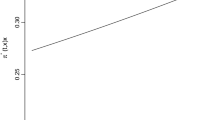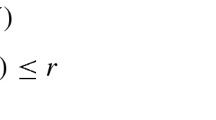Abstract
This paper is concerned with partially observed risk-sensitive optimal control problems. Combining Girsanov’s theorem with a standard spike variational technique, we obtain some general maximum principles for the aforementioned problems. One of the distinctive differences between our results and the standard risk-neutral case is that the adjoint equations and variational inequalities strongly depend on a risk-sensitive parameter γ. Two examples are given to illustrate the applications of the theoretical results obtained in this paper. As a natural deduction, a general maximum principle is also obtained for a fully observed risk-sensitive case. At last, this result is applied to study a risk-sensitive optimal portfolio problem. An explicit optimal investment strategy and a cost functional are obtained. A numerical simulation result shows the influence of a risk-sensitive parameter on an optimal investment proportion; this coincides with its economic meaning and theoretical results.
Similar content being viewed by others
References
Yong, J.M., Zhou, X.Y.: Stochastic Controls: Hamiltonian Systems and HJB Equations. Springer, New York (1999)
Bensoussan, A., Van Schuppen, J.H.: Optimal control of partially observable stochastic systems with an exponential-of-integral performance index. SIAM J. Control Optim. 23, 599–613 (1985)
Charalambous, C.D., Hibey, J.L.: Minimum principle for partially observable nonlinear risk-sensitive control problems using measure-valued decomposition. Stoch. Stoch. Rep. 57, 247–288 (1996)
Nagai, H.: Risk-sensitive dynamic asset management with partial information. In: Hida, T., Karandikar, R.L., Kunita, H., Rajput, B.S., Watanale, S., Xiong, J. (eds.) Stochastic in Finite and Infinite Dimension, A volume in Honor of Gopinath Kallianpur, pp. 321–340. Birkhäuser, Boston (2000)
Nagai, H., Peng, S.G.: Risk-sensitive dynamic portfolio optimization with partial information on infinite time horizon. Ann. Appl. Probab. 12, 173–195 (2002)
Bensoussan, A.: Maximum principle and dynamic programming approaches of the optimal control of partially observed diffusions. Stochastic 9, 169–222 (1983)
Haussmann, U.G.: The maximum principle for optimal control of diffusions with partial information. SIAM J. Control Optim. 25, 341–361 (1987)
Baras, J.S., Elliott, R.J., Kohlmann, M.: The partially observed stochastic minimum principle. SIAM J. Control Optim. 27, 1279–1292 (1989)
Zhou, X.Y.: On the necessary conditions of optimal controls for stochastic partial differential equations. SIAM J. Control Optim. 31, 1462–1478 (1993)
Li, X.J., Tang, S.J.: General necessary conditions for partially observed optimal stochastic controls. J. Appl. Probab. 32, 1118–1137 (1995)
Baghery, F., Øksendal, B.: A maximum principle for stochastic control with partial information. Stoch. Anal. Appl. 25, 705–717 (2007)
Peng, S.G.: A general stochastic maximum principle for optimal control problems. SIAM J. Control Optim. 28, 966–979 (1990)
Hamadène, S.: Backward-forward SDE’s and stochastic differential games. Stoch. Process. Appl. 77, 1–15 (1998)
Wu, Z., Yu, Z.Y.: Linear quadratic nonzero-sum differential games with random jumps. Appl. Math. Mech. 26, 1034–1039 (2005)
Kalman, R.E.: A new approach to linear filtering and prediction problems. Trans. ASME—J. Basic Eng. Ser. D 82, 35–45 (1960)
Liptser, R.S., Shiryayev, A.N.: Statistics of Random Process. Springer, New York (1977)
Wohnam, W.H.: On the separation theorem of stochastic control. SIAM J. Control 6, 312–326 (1968)
Karatzas, I., Shreve, S.E.: Methods of Mathematical Finance. Springer, New York (1998)
Author information
Authors and Affiliations
Corresponding author
Additional information
Communicated by F. Zirilli.
This work was partially supported by the National Natural Science Foundation (10671112), the National Basic Research Program of China (973 Program, No. 2007CB814904), the Natural Science Foundation of Shandong Province (Z2006A01) and the Doctoral Fund of the Education Ministry of China.
Rights and permissions
About this article
Cite this article
Wang, G.C., Wu, Z. General Maximum Principles for Partially Observed Risk-Sensitive Optimal Control Problems and Applications to Finance. J Optim Theory Appl 141, 677–700 (2009). https://doi.org/10.1007/s10957-008-9484-1
Published:
Issue Date:
DOI: https://doi.org/10.1007/s10957-008-9484-1




